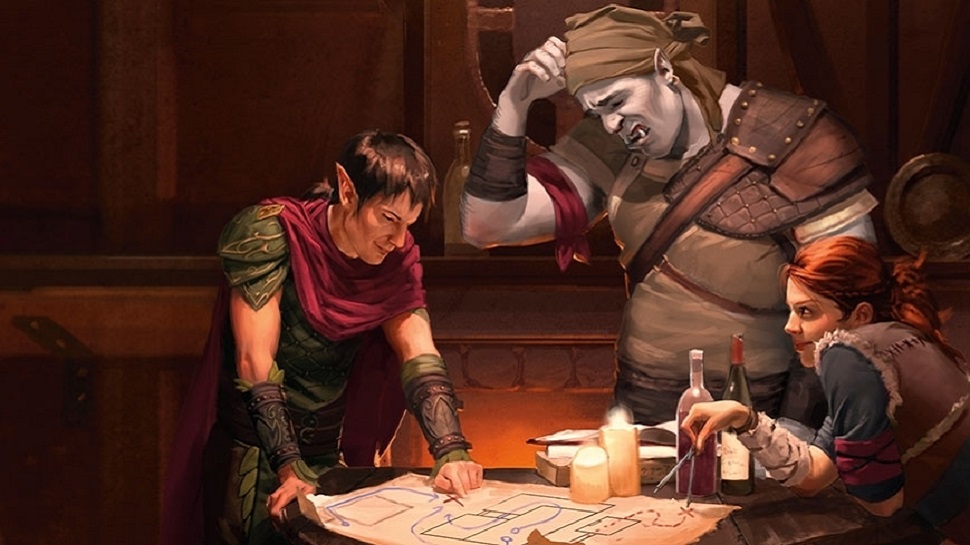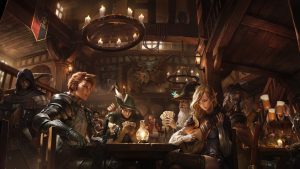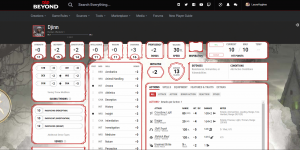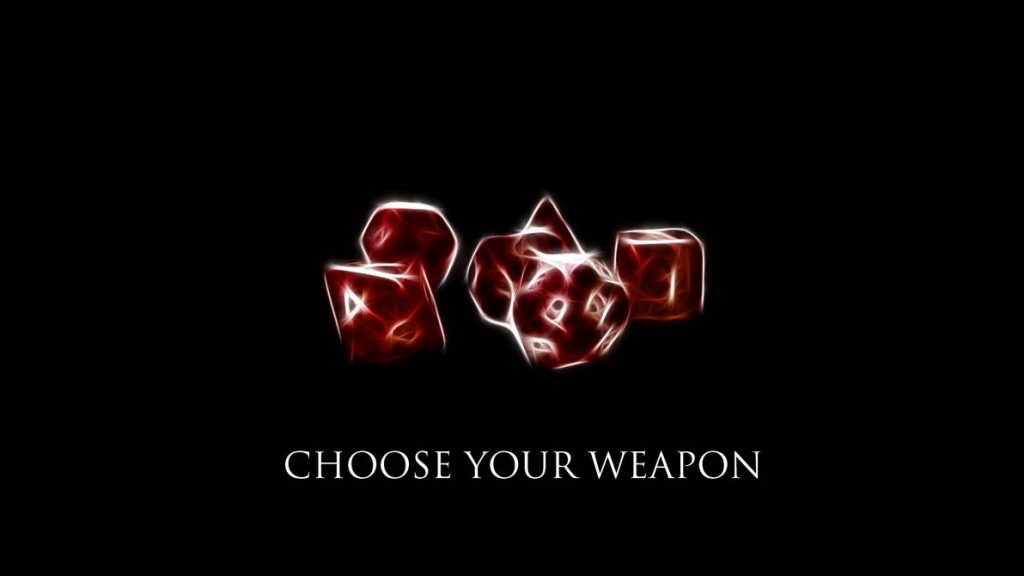Getting Started With Dungeons and Dragons
Dungeons and Dragons (aka D&D) has been around for decades, but in recent years it’s become more popular than ever. From starring in Stranger Things, to streaming success on Twitch and videos on YouTube with celebrities like Vin Diesel, Deborah Ann Woll, and Terry Crews featuring on broadcast games, the audience of potential gamers has never been greater. More than a few authors we have featured here on the Fantasy Hive have noted D&D as an influence on their writing, as well as members of our own team.
With that in mind, we here at the Hive thought we’d share our own experiences. Not so much a ‘how to,’ as there are plenty of other people far more qualified to explain the ins and outs of the game. Nor will it fit the usual ‘tips and tricks’ type article, FAQ or ‘beginner’s guide to’. This feature will focus on getting started with D&D, and hopefully with enough encouragement (/peer pressure) other members of the Fantasy Hive will share their own experiences in the future. Who knows, we might even get a short story or a field report from a game, or an overview of a class…time will tell.
Please note: whilst this article has been written with ‘something for everyone’ in mind, this getting started feature will focus on players, not dungeon masters. I have only recently started playing D&D, but have wanted to play since I was a kid (20~ years). I still have a lot to learn, but I wanted to share my experience and excitement, because when you are just getting started it can feel a little overwhelming.
What is D&D?
Dungeons and Dragons is a role-playing game. In it, you take on the role of a character and play them in the game. Because of this you can be anyone or anything you want. Once you have your character, and a party to join (i.e. friends to play with!) you can jump right into the game. (More on this in a minute.)
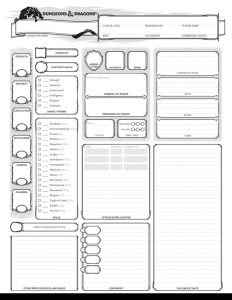
All you need to get started is a blank character sheet and a set of polyhedral dice (or do it all online at D&D Beyond!)
What do I need to play?
The beauty of D&D is that you only need a pen and some paper (preferably a filled-out character sheet), and a few dice to roll as part of the game. But most important is your imagination.
What about the rules?
In terms of ‘rules’ you can splash out on the Players’ Handbook (for players) or the Dungeon Masters’ Guide (for, well, dungeon masters) and any of the other supplements, including the Monster Manual, or any of the campaign settings and other resources.
But if you’re starting out, you can use a copy of the basic rules that are available online for free.
Yes, you read that right.
Wizard of the Coast provided these because they wanted to reduce the barrier for entry as much as possible, which is great if you ask me.
Note: there is something called ‘The Starter Set’ which comes with a compact rules handbook, pre-made characters, and an introductory adventure. This might be worth looking into if you’re really unsure of ‘where to start,’ but personally speaking a copy of free basic rules available online is all you need in terms of ‘material’.
Hang on…back up. You mentioned characters?
Yes, characters. Some players come to the table with a character in mind, others come up with their alter-egos based on what is presented to them. First and foremost is the decision on race and class.
Races: The core game offers up a number of ‘races’ from the fantasy favourites of Dwarf, Elf, Gnome, Human and more (others include giant-like Goliaths and devilish Tieflings).
Classes: In addition to your race, you have classes. These include the fantasy ‘holy trinity’ of fighter (warrior), wizard (magic user) and rogue (thief), as well as classes like warlock, druid, ranger, paladin, cleric and more.
Add into these starting races/classes those included in expansions (i.e. the aforementioned Goliath isn’t included in the Player’s Handbook, and Critical Role’s Tal’Dorei supplement includes the Gunslinger class) as well as the ability to ‘homebrew’ yourself a new race/class, you are presented with endless opportunities.
Give me an example…
You could opt to be a Dwarf warrior named Gimli, a Human wizard named Hermione, or a Drow Elf Ranger named Drizzt.
Or you could flip things entirely on their head and be Gary the Half-orc Cleric who heals and gives aid to others, sworn to help those in need after growing up on the streets in a society which shuns him. Maybe you fancy a character like Gnasher the Gnome Barbarian, who wields an axe bigger than she is tall, with a penchant for kneecaps, whose favourite drink is a Bloody Mary with real orc blood (sorry Gary).
You can be whoever you want to be. And ultimately, race/class is a very small part of what your character is, not who they are.
So, I’m going to play Gary the Half-Orc Cleric / Gnasher the Gnome Barbarian. Does that mean my job is to heal my party / kill everything with my axe?
Yes and no. I won’t go into the mechanics of ability scores and proficiencies, but while your class does dictate a lot of what your character can do when you start out, it doesn’t mean you have to play the character that way.
Let’s take Gary for example. As a cleric, one of his key stats should be wisdom, as a lot of his abilities depend on this to be effective. But, as a cleric, he is also proficient in armour, allowing him to stand on the front line and go toe to toe with the enemy. As a half-orc, maybe this is what Gary wants? To wade in kicking ass in the name of his chosen god, while throwing out heals to his allies when they start to fall behind. Again – the choice is yours!
Same goes for Gnasher. Is she going to fly into a rage and charge ahead of the party, or is she going to work herself up into a frenzy and act as a shield for her friends? Personally, I like the idea of Gnasher making a daisy-chain out of Kobold kneecaps, but that might not be for everyone.
As your character – and YOU – develop over time, you get more things to choose from, e.g. spells, abilities, feats, equipment etc. But it’s important to remember that it’s not what’s on the character sheet that counts – it’s YOU who determines how you play.
Does that mean I have to act like my character?
Up to you! In the D&D game I have been lucky enough to join, the players freely switch between ‘I am going to’ and ‘he / she is going to’ and actually saying something ‘in character’.
For example, one exchange from our game (not verbatim, but you’ll get the gist):
Beth (player): Heal Eriss (warrior character).
Me (in-character): She’s fine, just a flesh wound.
Anna (Eriss’ player speaking in-character): I’m bleeding out
Me (player): How much health do you have left?
Anna (player): 6.
Beth (in-character): she’s bleeding out!
Me (in-character): I could heal you…but it will cost you 5 gold.
That all might sound very confusing, but it’s really not. Over time I like the idea of acting out my character more, maybe even giving him an accent of sorts, but for now I am still learning and loving every minute of play.
How do I go about making a character properly? Is there a form to fill out? Like a CV?
Right, let’s get to a bit of nitty gritty.
There are lots of different versions of D&D character sheets. The official one in the basic rules / Players’ handbook covers everything, though it can still get a little confusing when you’re starting out (proficiency scores, I’m looking at you).
Personally speaking, I filled out the template as best I could with a little help from my party and our benevolent DM (hi Ken – please don’t kill me!).
Once we’d played our first game, I started using the character sheet available on D&D Beyond – sign up for free and use the ‘wizard’ (har-de-har) to generate your character sheet. It does the math and heavy lifting for you, so you can focus on the cool things like picking weapons and spells.
But I don’t know whether I could do it / it sounds very complicated / I don’t have any imagination…
Anyone can do it. Seriously. And once you start, it soon becomes less complicated as you grow comfortable with it. Not only that, but the rules are applied at the discretion of the dungeon master, and at the end of the day it’s a game not a test. D&D is about having fun.
And on the note of imagination…
My wife was put off from playing because, in her own words, ‘I don’t have any imagination.’ After one session she was sold to the point she was shopping for dice to match her character and sneaking off with the Player’s Handbook to find out more about her spells.
Okay, this sounds great. Anything else to bear in mind before starting out?
So, speaking from personal experience…
I found (as a player) that it was best not to take the first game session too seriously. Especially on the rules front. Let yourself and the rest of your party settle into a dynamic – socially amongst you AND your characters, as well as with the mechanics of the game. After all, the social aspect is more important than any dice roll when starting out.
Oh, and if you get a chance, check out an episode of one of the D&D streaming shows like Critical Role, Acquisitions Inc., Force Grey, Maze Arcana or even the ‘official’ stream Dice, Camera, Action. I listened to Critical Role on nights when our third baby wouldn’t settle down of an evening. It gave me a really good feel for how things like dice rolls for skill checks work (e.g. persuading someone, or opening a door with thieves’ tools), as well as combat, spell casting, and just general mechanics as well as inspiration for my own games.
Last, but certainly not least, remember to have fun! Ultimately, you can play D&D any way you want to. The aim of the game isn’t to ‘win’ or score points – it’s about having fun with friends. Oh, and maybe, just maybe, going up against a dragon or two and living to tell the tale…

